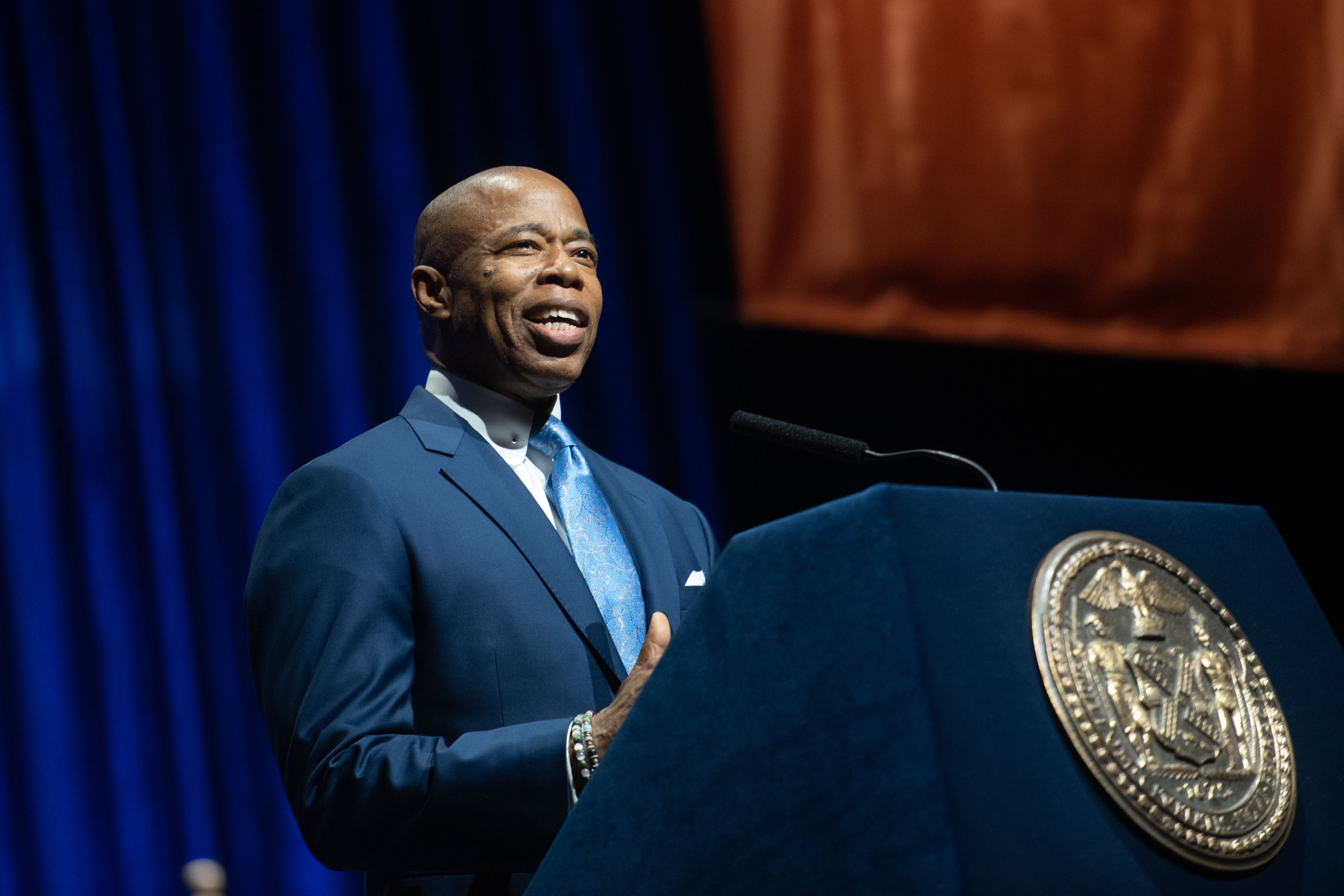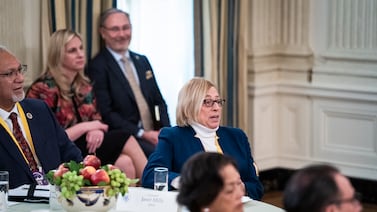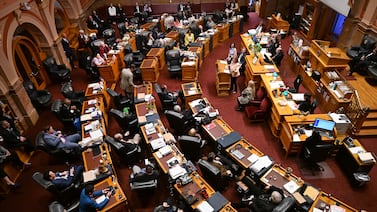Sign up for Chalkbeat New York’s free daily newsletter to keep up with NYC’s public schools.
Parents, educators, and others at a Bronx public hearing voiced their concerns about New York City’s long-standing mayoral control system with a resounding message: the system should end or be revised.
Common themes emerged among the more than 40 speakers during Tuesday night’s hearing at DeWitt Clinton High School. Many pointed to the instability of hinging major education policies on an elected official who can change as often as every four years, while also criticizing sweeping school initiatives helmed by current and former mayors.
The hearing was the first of five that state officials are hosting in each borough through January, offering families, educators, school staff, and others an opportunity to weigh in on the city’s mayoral control system. (The hearings are in-person and live-streamed.) It comes as part of a comprehensive state review of New York City’s school governance structure, which is set to expire on June 30.
That means that Mayor Eric Adams will need to return to Albany in the next legislative session if he hopes to retain control of the nation’s largest school system.
Christina Cover, a Bronx special education teacher and literacy coordinator, spoke at the hearing in praise of the city’s ongoing literacy curriculum overhaul — one of the Adams administration’s most significant educational policies. But despite feeling that initiative was important, she urged the city to adopt a community-based school governance model.
“This initiative — like the many initiatives before — risks being stopped completely with the start of a new mayoral administration,” she said. “Mayoral control, for better or for worse, ties educational initiatives to wide scale and massively funded mayoral campaign cycles.”
She continued: “Not everyone votes for a mayor on educational issues. School accountability during mayoral elections is hardly accountability at all.”
Speakers criticize Bloomberg, Adams educational policies
In arguing against the current system, other speakers pointed to what they saw as harmful mayoral decisions.
Sandy Wong, a kindergarten teacher at P.S. 30 in the Bronx, said her community suffered under the policies of former Mayor Michael Bloomberg, who in 2002 became the first chief executive to gain full control of the school system. She decried Bloomberg’s decisions to close many low-performing schools and champion charter school alternatives, and worries now that Adams’ call to cut nearly $550 million from the city’s schools budget will further harm her students.
“The teachers and parents in our school district are always putting their hands in their pockets to pay for basic school supplies like pencils, erasers, erasable markers, glue sticks, and paper,” she said. “My students, particularly those from marginalized communities, are disproportionately affected, falling behind their peers and other school districts.”
Students in the Bronx scored the lowest rates of proficiency among the five boroughs on the most recent state reading and math exams, according to city data.
Mayoral control has been regularly extended over the past two decades, though often with tweaks. It has relied on the mayor’s power to choose the schools chancellor and appoint a majority of members to the city’s Panel on Educational Policy, or PEP, which votes on major policy proposals and contracts.
Adams retained both in a deal state lawmakers struck in 2022, but some changes weakened his level of control. One change, for example, meant PEP members could no longer be removed for voting against their appointer’s wishes, making it harder to remove a panelist for opposing proposals from City Hall. At the same time, the board also expanded from 15 to 23 members, with the mayor appointing 13 of them and keeping the majority.
Speakers who wanted the current system amended repeatedly called for further checks and balances to be placed on the mayor’s power, particularly when it comes to the PEP.
At the hearing, Naveed Hasan, one of five PEP members elected by the city’s parent councils, alleged his own role on the panel was “a farce.”
“The majority of the members on the PEP are appointed by the mayor and never act independently, always approving whatever City Hall finds politically expedient,” said Hasan, who represents Manhattan. “My role on the PEP is rendered meaningless under a rubber-stamp panel under mayoral control.”
Schools Chancellor defends mayoral control system
One of Tuesday night’s few defenders of the status quo came from the Adams’ administration: schools Chancellor David Banks.
Banks, who referred to the current system only as “mayoral accountability,” admitted there was “no perfect governance system.” As someone who has worked in New York City public schools for decades — as a school safety agent, teacher, and principal — he said he’s seen improvements under the current structure.
“I know from firsthand experience the flaws of the previous system and the ways that our students suffered as a result,” he said. “Mayoral accountability, in contrast, is as close as we can get to a system that is the most manageable, least politicized, and most impactful.”
As the chancellor’s time expired, an audience member loudly booed.
Rebukes of the city’s mayoral control system long predate the Bronx hearing. Ahead of the public testimony, some used their positions on parent councils to voice their opposition.
In a resolution passed last week by the Citywide Council on Special Education, members called on the state legislature to end mayoral control, citing “a lack of checks and balances that would otherwise be provided by a democratically elected school board,” among other concerns.
New York City isn’t the only large school system grappling with its centralized school governance structure. In Chicago, where mayoral control of schools was established in 1995, the city will transition to a fully elected school board by 2027.
Julian Shen-Berro is a reporter covering New York City. Contact him at jshen-berro@chalkbeat.org.







